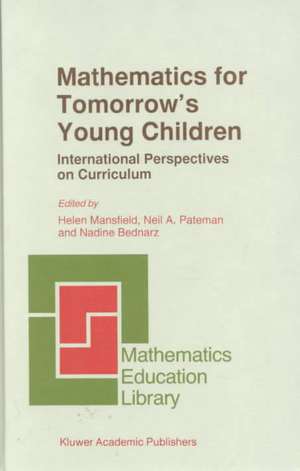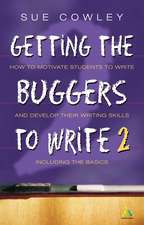Mathematics for Tomorrow’s Young Children: Mathematics Education Library, cartea 16
Editat de C.S. Mansfield, N.A. Pateman, N. Bednarzen Limba Engleză Hardback – 30 iun 1996
Toate formatele și edițiile
| Toate formatele și edițiile | Preț | Express |
|---|---|---|
| Paperback (1) | 946.72 lei 6-8 săpt. | |
| SPRINGER NETHERLANDS – 6 dec 2010 | 946.72 lei 6-8 săpt. | |
| Hardback (1) | 952.89 lei 6-8 săpt. | |
| SPRINGER NETHERLANDS – 30 iun 1996 | 952.89 lei 6-8 săpt. |
Din seria Mathematics Education Library
-
 Preț: 389.70 lei
Preț: 389.70 lei - 15%
 Preț: 645.96 lei
Preț: 645.96 lei - 18%
 Preț: 742.97 lei
Preț: 742.97 lei - 18%
 Preț: 1394.84 lei
Preț: 1394.84 lei - 18%
 Preț: 942.10 lei
Preț: 942.10 lei - 18%
 Preț: 1544.80 lei
Preț: 1544.80 lei - 15%
 Preț: 652.49 lei
Preț: 652.49 lei - 18%
 Preț: 1325.82 lei
Preț: 1325.82 lei - 18%
 Preț: 1225.48 lei
Preț: 1225.48 lei - 15%
 Preț: 643.34 lei
Preț: 643.34 lei - 18%
 Preț: 1221.07 lei
Preț: 1221.07 lei - 18%
 Preț: 950.52 lei
Preț: 950.52 lei - 24%
 Preț: 1445.40 lei
Preț: 1445.40 lei - 18%
 Preț: 1224.54 lei
Preț: 1224.54 lei - 15%
 Preț: 651.19 lei
Preț: 651.19 lei -
 Preț: 391.61 lei
Preț: 391.61 lei - 18%
 Preț: 948.16 lei
Preț: 948.16 lei - 18%
 Preț: 944.19 lei
Preț: 944.19 lei - 18%
 Preț: 1380.95 lei
Preț: 1380.95 lei - 18%
 Preț: 947.85 lei
Preț: 947.85 lei - 18%
 Preț: 948.61 lei
Preț: 948.61 lei - 15%
 Preț: 635.31 lei
Preț: 635.31 lei - 15%
 Preț: 644.63 lei
Preț: 644.63 lei - 15%
 Preț: 646.43 lei
Preț: 646.43 lei - 15%
 Preț: 647.59 lei
Preț: 647.59 lei
Preț: 952.89 lei
Preț vechi: 1162.06 lei
-18% Nou
Puncte Express: 1429
Preț estimativ în valută:
182.33€ • 190.37$ • 150.91£
182.33€ • 190.37$ • 150.91£
Carte tipărită la comandă
Livrare economică 04-18 aprilie
Preluare comenzi: 021 569.72.76
Specificații
ISBN-13: 9780792339984
ISBN-10: 0792339983
Pagini: 329
Ilustrații: XI, 329 p.
Dimensiuni: 156 x 234 x 21 mm
Greutate: 0.66 kg
Ediția:1996
Editura: SPRINGER NETHERLANDS
Colecția Springer
Seria Mathematics Education Library
Locul publicării:Dordrecht, Netherlands
ISBN-10: 0792339983
Pagini: 329
Ilustrații: XI, 329 p.
Dimensiuni: 156 x 234 x 21 mm
Greutate: 0.66 kg
Ediția:1996
Editura: SPRINGER NETHERLANDS
Colecția Springer
Seria Mathematics Education Library
Locul publicării:Dordrecht, Netherlands
Public țintă
ResearchCuprins
1.1: Young Children’s Mathematical Learning: Complexities and Subtleties.- 2.1: Constructivism and Activity Theory: A Consideration of Their Similarities and Differences as They Relate to Mathematics Education.- 2.2: A Sociocultural View of the Mathematics Education of Young Children.- 2.3: Social-Cultural Approaches in Early Childhood Mathematics Education: A Discussion.- 3.1: The Psychological Nature of Concepts.- 3.2: What Concepts are and How Concepts are Formed.- 3.3: Young Children’s Formation of Numerical Concepts: Or 8 = 9 + 7.- 3.4: Concept Formation Process and an Individual Child’s Intelligence.- 4.1: Interactions between Children in Mathematics Class: An Example Concerning the Concept of Number.- 4.2: What is the Difference between One, UN and YI?.- 4.3: How do Social Interactions among Children Contribute to Learning?.- 4.4: Cultural and Social Environmental Hurdles a Tanzanian Child Must Jump in the Acquisition of Mathematics Concepts.- 5.1: Limitations of Iconic and Symbolic Representations of Arithmetical Concepts in Early Grades of Primary School.- 5.2: Language Activity, Conceptualization and Problem.- 5.3: Children Talking Mathematically in Multilingual Classrooms: Issues in the Role of Language.- 5.4: Use of Language in Elementary Geometry by Students and Textbooks.- 6.1: Concept Development in Early Childhood Mathematics: Teachers’ Theories and Research.- 6.2: Teachers’ Beliefs about Concept Formation and Curriculum Decision-Making in Early Mathematics.- 6.3: Classroom Models for Young Children’s Mathematical Ideas.- 6.4: Joensuu and Mathematical Thinking.- 7.1: Future Research Directions in Young Children’s Early Learning of Mathematics.












